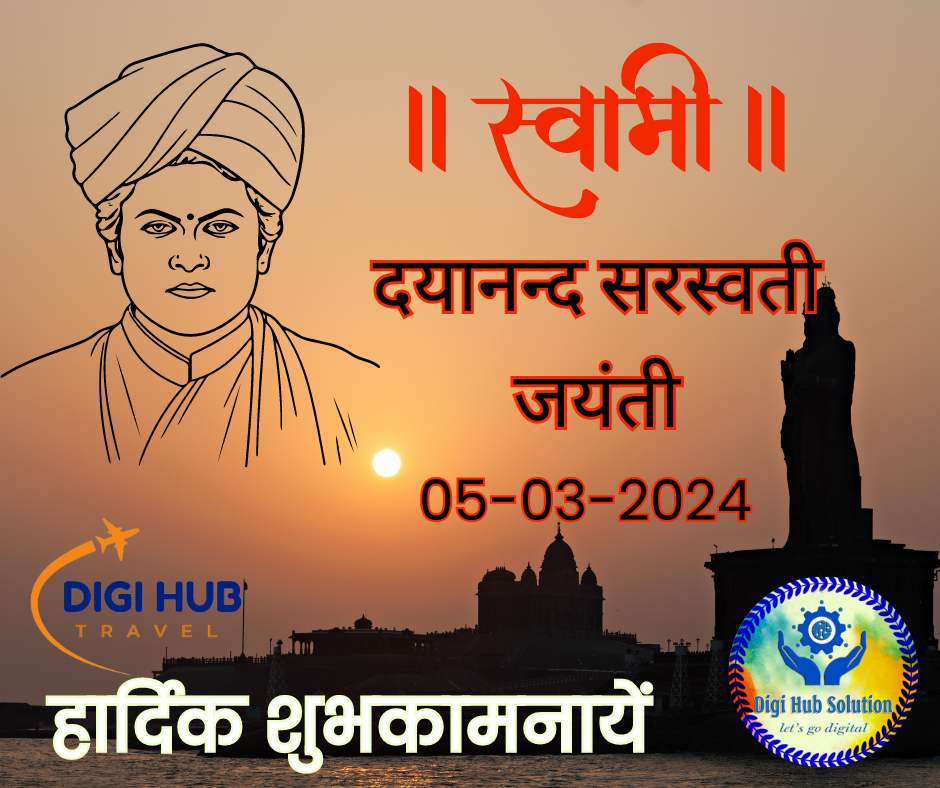Dayanand Saraswati was born on 12 February 1824 in Tankara, near Morbi (Morvi princely state of Mumbai), in Kathiawar region (district Rajkot), Gujrat. His father’s name was Karsanji Lalji Tiwari and mother’s name was Amrita Bai (Amba Bai). His father was a tax-collector and a rich and influential man from a Brahmin clan. Due to his birth in Sagittarius and Mool Nakshatra, Swami Dayanand Saraswati was named Moolshankar in his childhood. His early life was spent very comfortably. Dayanand Saraswati’s mother was a Vaishnav while his father was a follower of Shaivism. Later, to become a scholar, he started studying Sanskrit, Vedas, Shastras and other religious books.

Awareness on Mahashivratri
Child Moolshankar, a staunch devotee of Shiva, was asked by his father to observe a fast on the occasion of Mahashivratri. At night in the Shiva temple, when the child saw rats creating havoc on the shiva Linga, he realized that this was not the Shankar whose story had been narrated to him. After this Moolshankar went home from the temple and curiosity about the true Shiva arose in his mind.
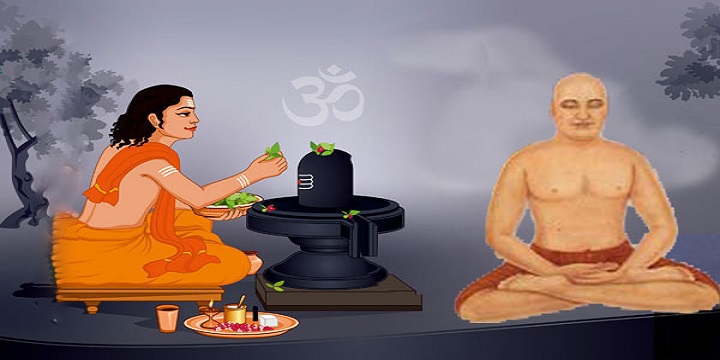
Abandonment of home
Due to the death of his younger sister and uncle due to cholera, he started thinking deeply about the meaning of life and death and started asking such questions which worried his parents. His parents then decided to marry him off in his early teens (this was a common practice in 19th century Aryavarta (India). But the boy Moolshankar decided that marriage was not for him and he set out in search of the truth in 1846.
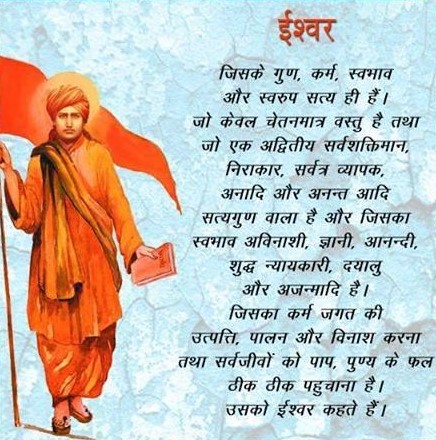
Pursuit of knowledge
There was a new turn in his life on the day of Shivratri in Falgun Krishna Samvat 1845. He left home and while travelling, he reached Guru Swami Virjanand. Guruvar made him study Panini Grammar, Patanjala-Yoga Sutra and Veda-Vedanga.
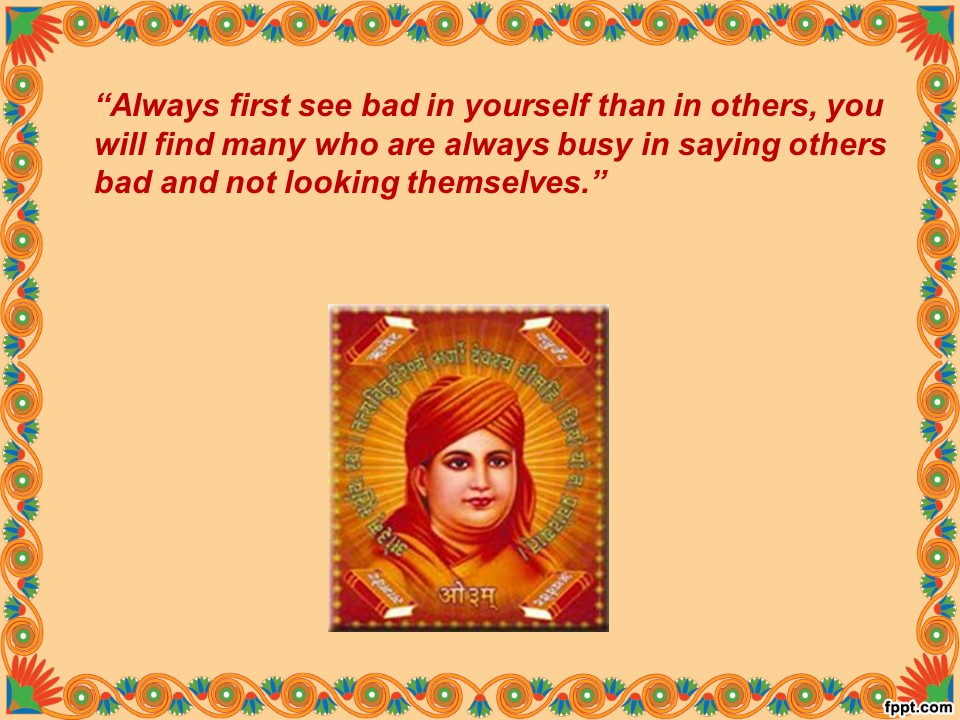
After gaining knowledge
Maharishi Dayanand traveled to many places. He hoisted the ‘Pakhand Khandini Pataka’ on the occasion of Kumbh in Haridwar. He did many scriptures. He came in contact with Babu Keshavchandra Sen and Devendra Nath Tagore in Calcutta.
Establishment of Arya Samaj
Maharishi Dayanand established Arya Samaj in Girgaum Mumbai on Chaitra Shukla Pratipada Samvat 1932 (1875). The rules and principles of Arya Samaj are for the welfare of every living being. The main objective of this society is to do good to the world, that is, to achieve physical, spiritual and social progress.
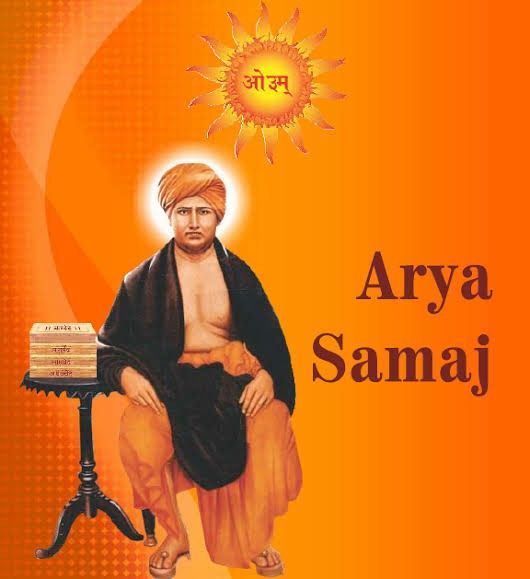
Ideological movements, debates and lectures
There is no other scripture proof except the Vedas – To propagate this truth, Swamiji started touring the entire country and wherever he went, the pundits and scholars of the ancient tradition started accepting defeat from him. He had profound knowledge of Sanskrit language. He spoke fluently in Sanskrit. He was also a very logical person.
He had thoroughly studied and pondered over Christian and Muslim religious scriptures. Therefore, along with his disciples, he started a struggle on three fronts. Two fronts were of Christianity and Islam but the third front was of Sanatan Dharma Hindus. There was no answer to the torch of rationalism lit by Dayanand.
Social reform work
Maharishi Dayanand had extensive contribution in social reform. Maharishi Dayanand refuted and opposed the social evils, superstitions, stereotypes, evils and hypocrisies prevalent in the then society. In his book Satyarth Prakash, he introduced the society to spirituality and theism. He was a yogi and had special emphasis on pranayam. He was in favor of participation of all castes and women in social restructuring. Not only did he display a sense of patriotism, he was also among the first to participate in the freedom struggle of 1857.

Opposition to social evils
- Born racism
- Untouchability
- Child marriage
- Polygamy
- Tradition of Sati
- Deceased shraadh
- Animal sacrifice
- Male sacrifice
- Purdah system
- Devdasi system
- Prostitution
- Burying dead bodies or dumping them in the river
- Bury dead children
- Denial of sea travel ban
Social reform work
- Support of caste system based on qualities, actions and nature
- purification movement
- dalit emancipation
- widow marriage
- interracial marriage
- Education for all campaign
- women empowerment
- women’s right to education
- Everyone has the right to read Vedas
- gurukul education
- Establishment of the first Hindu orphanage
- Establishment of the first cowshed
- Swadeshi movement
- Hindi language support
Murder conspiracy
After completing his studies with Guru Virjanand in 1863, during his tenure of about twenty years, there were about 44 attempts to murder and insult Dayanand Saraswati. Out of which, 17 attempts were made to take life by giving poison through various means.
Last attempt
The circumstances under which Swamiji died also give the impression that there was definitely some conspiracy by the British government in it. Swamiji died in the evening on 30 October 1883, the day of Diwali. In those days, he had gone to Jodhpur on the invitation of Jodhpur King Maharaj Jaswant Singh. His sermons were held there regularly. Sometimes Maharaj Jaswant Singh would also sit at his feet and listen to his sermons there. Swamiji also visited the state palaces two-four times. There he saw the unnecessary interference of a prostitute named Nanhi and her immense influence on Maharaj Jaswant Singh. Swamiji felt very bad about this. When she explained this to Maharaj, he politely accepted her words and broke relations with Nanhi. Due to this, the little girl became very against Swamiji. He recruited Swami ji’s cook Kaliya alias Jagannath and got him to put crushed glass in his milk. After some time, he came to Swamiji and confessed his crime and asked for forgiveness for it. The generous-hearted Swami ji gave him five hundred rupees for travel expenses and living expenses and sent him away from there so that the police would not harass him. Later, when Swamiji was admitted to the hospital in Jodhpur, the doctor concerned there also remained under suspicion. He was accused of giving mild poison to Swamiji in the name of medicine. Later, when Swamiji’s health started deteriorating, he was brought to the hospital in Ajmer. But by then it was too late. Swamiji could not be saved.

The suspicion in this entire incident is that the work of instigating the prostitute and deceiving the doctor was done by some British officer at the behest of the British government. Otherwise, it was not possible for an ordinary prostitute to hatch such a conspiracy against a well-known and popular person like Swami Dayanand Saraswati on her own strength. Even a doctor could not have taken such audacity without any encouragement and protection.
Last words
Maharishi died on 30 October 1883 in Ajmer. The body of Swami Dayanand ji, the pioneer of Swadharma, Swabhasha, Swarashtriya, Swachculture and Swadeshi progress, merged into Panchatattva on the day of Diwali in 1883 and he left behind a principle, Krivanto Vishwamaryam – i.e. make the whole world a great human being. His last words were – “Lord! You have done a good act. May your wish be fulfilled.”
Writing biography
Along with Maharishi’s literature, his life story is also very inspiring. Many people wrote biographies on Maharishi, among whom Pandit Lekhram, Satyanand etc. are prominent. But the specialty of ‘Dayanand Charit’ written in Bengali language by Bengali gentleman Babu Shri Devendranath Mukhopadhyay is that Devendranath Mukhopadhyay ji himself was not an Arya Samaji, yet being very devout, he spent 15-16 years continuously and spent thousands of rupees to publish the material of sage’s life. He collected and wrote an authentic and systematic biography of the Maharishi. Fortunately, the work of writing this biography could not be completed and Devendranath ji died untimely. Thereafter, with the help of the material collected by Pt. Lekhram and Satyananda, Pt. Ghasiram completed it. This is a very authentic biography of Maharishi.
Pandit Lekhram’s research especially in Punjab, U.P. And remained limited to Rajasthan only. He neither traveled much nor did much research in Mumbai and Bengal province, hence the incidents in these two provinces are not described in as much detail in his book as the incidents in Punjab, UP and Rajasthan. There is also a detailed description of Mumbai and Bengal in Devendranath ji’s book.
Thoughts of great men about the contribution of Swami Dayanand
- Dr. Bhagwan Das had said that Swami Dayanand was the main architect of Hindu renaissance.
- Mrs. Annie Besant said that Swami Dayanand was the first person who declared ‘Aryavarta (India) for the Aryavartis (Indians)’.
- According to Sardar Patel, the foundation of India’s independence was actually laid by Swami Dayanand.
- Pattabhi Sitaramaiya was of the opinion that Gandhiji is the Father of the Nation, but Swami Dayanand is the Father of the Nation.
- According to French writer Romain Rolland, Swami Dayanand was trying to give an active form to national sentiment and public awareness.
- Another French writer Richard said that Rishi Dayanand had appeared to free people from prison and break caste barriers. His ideal is – Aryavarta! Get up, wake up, move forward. The time has come, enter the new era.
- Lokmanya Tilak said to Swamiji, “The person who first gave the mantra of Swaraj and Swadeshi was Dayanand, the shining star.”
- Netaji Subhash Chandra Bose considered him the “proto-creator of modern India”.
- Madame Blavatsky of America considered him “the most fearless attacker on evil since Adi Shankara.”
- In the words of Syed Ahmed Khan, “Swami ji was such a learned and excellent person, whom other followers also respected.”
- Veer Savarkar said that Maharishi Dayanand was the first warrior of the war.
- Lala Lajpat Rai said – Swami Dayanand taught us to think independently, speak and perform our duties.
Writing and literature
Swami Dayanand Saraswati wrote many religious and social books during his lifetime. The initial books were in Sanskrit, but with time he also wrote many books in Aryan language (Hindi), because Aryan language had more reach than Sanskrit. He named Hindi as ‘Aryabhasha’. Swami Dayanand was the pioneer and the first person to use Aryan language for good writing. If we go by the scriptures and thoughts of Rishi Dayanand Saraswati (although these thoughts were created by the Rishi himself but were given by the Vedas), then the nation will once again become world leader, glorious, glorious, powerful, prosperous, virtuous and great.
If the process of social reform of Rishivar Dayanand had not stopped due to his untimely death in 1883, then there would certainly have been no delay in India regaining the position of world leader. Even now, if the desire of making India a world leader is in the mind of the Aryan race, then they will have to understand the essence of the sage’s words and make them the basis of their work. On his birthday, we salute that great soul who lit many lamps of knowledge even when they were extinguished, but today there is a need to go beyond that and follow the path that Maharishi ji had suggested.

